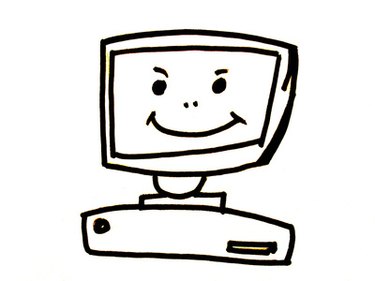
A computer that is reacting sluggishly can seriously cut productivity. Nothing can be more frustrating than to have a computer that takes a tediously long time to complete a task. During your computer's lifetime, you may have downloaded a lot of programs, gotten infected with plenty of computer viruses, and may even have installed a brand-new operating system into your machine. However, there are a few tweaks that you can make that can help your computer to be up and running like new.
Things You'll Need
Video of the Day
- Antivirus program
- RAM module
Video of the Day
Step 1
Remove any spyware, adware, malware and computer viruses from your system. Computer viruses will cause your computer to become sluggish, with incessant pop-ups, loss of Internet bandwidth, unauthorized processes and the hijacking of your computer's memory. An antivirus program will scan your computer, detect infections and quarantine viruses. PC Magazine has a comprehensive list of recommended security programs. Check out the Resource section for a link to this list.
Step 2
Uninstall unused programs and defragment your hard drive. Unused programs will take up memory resources and will rob your hard drive of valuable memory. Navigate to the Control Panel. Click on "Add or Remove Programs." Sift through the list and delete any programs that you do not use anymore. After you have deleted unused programs, defragment your disk. Defragmenters will align computer memory and allow your computer to access this memory more efficiently. Click "Start" in the lower left corner of your screen. Navigate to "Accessories," then select "System Tools." Click on "Disk Defragmenter." Allow the program to defragment your disk. The defragmenting process can take a few hours.
Step 3
Detect and repair disk errors. As your hard drive ages, it can develop malfunctioning disk sectors. Bad sectors will slow down memory performance and may result in a computer with delayed reactions. The Error Checking Utility tool scans your disk for errors. Double click on "My Computer," then right-click on the hard disk that you want to check. Click on "Properties," then select "Tools." Click on "Check Now" under "Error-Checking." Click on "Start" and allow the tool to check your hard disk for bad sectors.
Step 4
Update your computer. Ensure that your computer is running at full velocity by keeping it updated. An outdated computer with outdated software and hardware peripherals will result in a computer with delayed reactions. Regularly download important updates. Check the Resource section for a link to update your computer.
Step 5
Increase the amount of available Random Access Memory on your computer system. Open your computer and install a RAM module into an available memory slot. Increasing RAM will increase the amount of memory resources available, resulting in a responsive computer. PC Magazine has a comprehensive guide as to how to select, install and fine-tune available RAM. Check the Resource section for this guide.